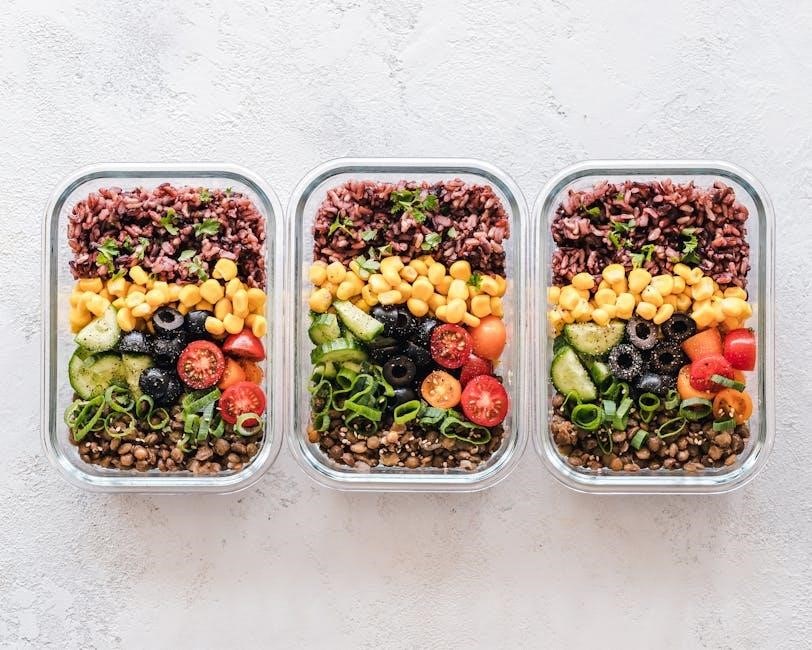
A well-structured PCOS diet plan helps manage symptoms like insulin resistance and hormonal imbalances․ It focuses on balanced nutrition, weight management, and improving overall metabolic health effectively․
1․1 Understanding PCOS and Its Impact on Nutrition
PCOS, or Polycystic Ovary Syndrome, affects millions of women, causing hormonal imbalances and metabolic issues․ It often leads to insulin resistance, weight gain, and irregular periods, which directly impact nutrition․ Women with PCOS may experience heightened cravings for carbohydrates due to insulin fluctuations, complicating dietary choices․ Managing nutrition becomes critical to regulate blood sugar, enhance insulin sensitivity, and support weight management, all of which are vital for alleviating PCOS symptoms and improving overall health․
1․2 Importance of Diet in Managing PCOS Symptoms
Diet plays a pivotal role in managing PCOS symptoms by stabilizing blood sugar, improving insulin sensitivity, and promoting hormonal balance․ A tailored diet helps reduce inflammation, enhance fertility, and support weight loss․ By focusing on nutrient-dense foods, women with PCOS can alleviate symptoms like acne, irregular cycles, and excess androgen levels․ A structured meal plan not only addresses physical health but also contributes to emotional well-being, making it a cornerstone of PCOS management strategies․
Key Principles of a PCOS-Friendly Diet
A PCOS-friendly diet emphasizes balancing macronutrients, incorporating anti-inflammatory foods, and selecting low-glycemic index options to regulate blood sugar and support hormone balance effectively․
2․1 Balancing Macronutrients for Hormone Regulation
Balancing macronutrients is crucial for hormone regulation in PCOS․ Focus on lean proteins like turkey and fish to stabilize blood sugar and support insulin function․ Healthy fats, such as avocados and nuts, promote hormone production and satiety․ Complex carbohydrates, including whole grains and vegetables, provide sustained energy without spikes․ This balance helps regulate hormones, improve insulin sensitivity, and support overall metabolic health effectively․
2․2 Incorporating Anti-Inflammatory Foods
Incorporating anti-inflammatory foods into your PCOS diet is essential for reducing inflammation and hormonal imbalances․ Focus on leafy greens, berries, and fatty fish like salmon, which are rich in omega-3s․ Turmeric, ginger, and olive oil also have potent anti-inflammatory properties․ These foods help lower inflammation, improve insulin sensitivity, and promote hormonal balance․ Regularly including them in meals can significantly support overall health and manage PCOS symptoms more effectively over time․
2․3 The Role of Low-Glycemic Index Foods
Low-glycemic index (GI) foods are crucial for managing PCOS as they prevent rapid blood sugar spikes․ Foods like whole grains, vegetables, and lean proteins release glucose slowly, improving insulin sensitivity․ This helps regulate blood sugar levels, reducing insulin resistance and metabolic complications․ Incorporating low-GI foods stabilizes energy levels, supports weight management, and enhances hormonal balance, making them a cornerstone of a PCOS-friendly diet for long-term health benefits and symptom control․

Sample 7-Day PCOS Meal Plan
A structured 7-day meal plan designed to stabilize blood sugar, improve insulin sensitivity, and promote hormonal balance․ Includes breakfast, lunch, dinner, and snack options tailored for PCOS management․
3․1 Breakfast Ideas for Blood Sugar Stability
Start your day with a nutrient-rich breakfast to maintain blood sugar levels․ A green smoothie made with spinach, protein powder, mixed berries, almond milk, and almond butter is an excellent choice․ This combination provides antioxidants, lean protein, and healthy fats, supporting hormone balance and energy․ Other options include scrambled eggs with vegetables or whole-grain toast with avocado․ These meals are designed to prevent blood sugar spikes and keep you energized throughout the morning․
3․2 Lunch Options to Maintain Energy Levels
For lunch, opt for balanced meals that combine lean protein, healthy fats, and complex carbohydrates․ A Turkey and Avocado Wrap with whole wheat tortilla, sliced turkey breast, mashed avocado, lettuce, and tomato is an excellent choice․ Alternatively, a grilled chicken salad with mixed greens, cherry tomatoes, cucumber, and olive oil vinaigrette provides sustained energy and supports blood sugar balance․ These meals are designed to keep you energized and focused throughout the afternoon while managing PCOS symptoms effectively․
3․3 Dinner Recipes to Promote Hormone Balance
Dinner should focus on hormone-friendly ingredients like lean proteins, omega-3 rich fish, and fiber-rich vegetables․ Baked salmon with quinoa and steamed broccoli is an excellent option, as it supports omega-3 intake and balances blood sugar․ Alternatively, grilled chicken with roasted sweet potatoes and green beans provides sustained energy and fiber․ These meals are designed to promote hormonal equilibrium while offering satisfying flavors and nutrients for overall well-being․
3․4 Healthy Snacks to Avoid Cravings
Snacking wisely is crucial for managing PCOS cravings and blood sugar spikes․ Opt for nutrient-dense options like almonds, walnuts, or pumpkin seeds, which are rich in healthy fats and fiber․ Fresh fruits such as berries or apples paired with almond butter provide natural sweetness and satisfaction․ Veggie sticks with hummus or guacamole are also excellent choices, offering fiber and anti-inflammatory benefits․ These snacks help stabilize hunger and support hormonal balance without triggering cravings․
Foods to Eat and Avoid for PCOS
Focus on whole, unprocessed foods, lean proteins, and low-glycemic options․ Avoid sugary, high-carb, and processed foods to support hormone balance and metabolic health․
4․1 Lean Protein Sources for Weight Management
Incorporate lean proteins like chicken, turkey, fish, tofu, and legumes to support weight loss and muscle maintenance․ These options help regulate blood sugar and improve insulin sensitivity, crucial for PCOS management․ Aim for 3-4 ounces per meal and vary sources to ensure balanced nutrition․ Avoid processed meats and opt for organic or wild-caught choices when possible․
4․2 Omega-3 Fatty Acids for Inflammation Reduction
Omega-3 fatty acids are essential for reducing inflammation, a key factor in PCOS management․ Include fatty fish like salmon, mackerel, and sardines, as well as flaxseeds and walnuts․ These foods help lower inflammatory markers and improve hormonal balance․ Aim for 2-3 servings of fatty fish weekly and sprinkle flaxseeds on meals for added benefits․ Omega-3s also support heart health and may enhance fertility outcomes in women with PCOS․
4․3 High-Fiber Foods for Digestive Health
High-fiber foods are crucial for PCOS management, aiding digestion and blood sugar stability․ Include whole grains, fruits, vegetables, and legumes to enhance gut health․ Fiber helps prevent insulin spikes, improves insulin sensitivity, and supports weight management․ Foods like oats, quinoa, broccoli, and berries are excellent choices․ Aim for 25-30 grams of fiber daily to promote regular bowel movements and reduce inflammation, key for managing PCOS symptoms effectively;

Benefits of a PCOS Diet Plan
Adopting a PCOS diet plan offers numerous benefits, including weight loss, improved insulin sensitivity, and hormone balance․ It reduces inflammation and enhances overall well-being effectively․
5․1 Weight Loss and Improved Insulin Sensitivity
A PCOS diet plan promotes weight loss by focusing on nutrient-dense foods that reduce insulin resistance․ Improved insulin sensitivity helps regulate blood sugar levels, minimizing cravings and metabolic imbalances․ By adopting a balanced eating approach, individuals with PCOS can achieve sustainable weight loss and enhance their body’s ability to respond to insulin, which is crucial for managing symptoms and improving overall hormonal balance․
5․2 Hormone Balancing and Fertility Enhancement
A PCOS diet plan plays a crucial role in balancing hormones, particularly insulin and androgens, which are often imbalanced in individuals with PCOS․ By incorporating anti-inflammatory foods, omega-3 fatty acids, and high-fiber options, the diet helps regulate menstrual cycles and improve ovulation․ This hormonal balance can enhance fertility, making it easier to conceive․ Additionally, weight loss from a structured diet further supports hormonal regulation, creating a more favorable environment for reproductive health and overall well-being․
5․3 Reduced Inflammation and Overall Well-being
A PCOS diet plan rich in anti-inflammatory foods like berries, leafy greens, and omega-3 fatty acids helps reduce inflammation, a common issue in PCOS․ Chronic inflammation can worsen symptoms like acne and insulin resistance․ By focusing on whole, nutrient-dense foods, individuals can minimize inflammation, leading to improved skin health and reduced discomfort․ This dietary approach also promotes overall well-being by stabilizing energy levels and enhancing mental health, creating a balanced foundation for managing PCOS effectively․

How to Create Your Own PCOS Diet Plan
Start by setting realistic goals and understanding your nutritional needs․ Focus on balanced macronutrients, anti-inflammatory foods, and low-glycemic options․ Track your progress and adjust accordingly for better results․
6․1 Setting Realistic Goals and Tracking Progress
Setting realistic goals is the foundation of a successful PCOS diet plan․ Start by identifying achievable targets, such as gradual weight loss or improving blood sugar levels․ Track your progress through a food diary or mobile apps to monitor eating habits and physical activity․ Regularly assessing your goals helps maintain motivation and ensures the plan remains tailored to your needs․ Adjustments can be made based on progress, ensuring long-term sustainability and success in managing PCOS symptoms effectively․
6․2 Consulting a Dietitian for Personalized Advice
Consulting a dietitian provides personalized guidance tailored to your specific needs and health goals․ They can create a customized PCOS diet plan, ensuring it aligns with your lifestyle and preferences․ A dietitian’s expertise helps identify the best foods, portion sizes, and meal timing to manage symptoms effectively․ They also offer support in tracking progress and making necessary adjustments․ Utilizing free resources like PCOS diet plan PDFs can complement professional advice, ensuring a comprehensive approach to achieving hormonal balance and overall well-being․

Additional Lifestyle Tips for PCOS Management
Regular physical activity and stress management techniques, like yoga or meditation, complement a PCOS diet plan․ Avoiding excessive alcohol and maintaining a healthy sleep schedule also supports symptom relief․
7;1 Regular Physical Activity for Metabolic Health
Regular physical activity is crucial for improving insulin sensitivity and metabolic health in PCOS․ Aim for at least 150 minutes of moderate-intensity exercise per week․ Incorporate cardio, strength training, and flexibility exercises to enhance hormonal balance and weight management․ Even small increases in daily movement can positively impact symptoms and overall well-being․ Consistency is key to achieving long-term benefits and supporting a healthy lifestyle․ Pairing physical activity with a balanced diet maximizes results for managing PCOS effectively․
7․2 Stress Management Techniques to Support Hormones
Stress management is vital for hormonal balance in PCOS․ Chronic stress disrupts cortisol levels, worsening insulin resistance and hormonal imbalances․ Techniques like yoga, meditation, and deep-breathing exercises can help reduce stress․ Prioritizing sleep and engaging in relaxation practices supports hormonal health․ Incorporating mindfulness activities, such as journaling or walking, also aids in stress reduction․ By managing stress effectively, women with PCOS can better regulate their hormones and improve overall well-being․ Regular stress management complements dietary and exercise efforts for optimal PCOS care․
Free PCOS Diet Plan PDF Resources
Download free PCOS diet plan PDFs, offering comprehensive guides, meal templates, and grocery lists․ These resources help kickstart your journey to a balanced, PCOS-friendly diet easily․
8;1 Downloadable 7-Day Meal Plan Templates
Downloadable 7-day meal plan templates provide structured guidance for managing PCOS symptoms․ These templates include balanced breakfast, lunch, dinner, and snack options, focusing on nutrient-dense, low-glycemic, and anti-inflammatory foods․ They often come with grocery lists and prep tips, making meal planning easier․ Many templates are grain-free or low-carb, catering to specific dietary needs․ These resources are available in digital formats, offering convenience and flexibility for women seeking to improve their metabolic and hormonal health through diet․
8․2 Comprehensive Grocery Lists and Recipes
Comprehensive grocery lists and recipes in PCOS diet plans provide detailed guidance for meal preparation․ These resources often include lean proteins, omega-3-rich foods, high-fiber options, and low-glycemic ingredients․ Recipes are designed to be easy to follow, promoting balanced nutrition and flavor․ Many plans exclude sugary and processed foods, focusing on whole, nutrient-dense alternatives․ These tools help streamline grocery shopping and cooking, ensuring meals align with PCOS management goals and support improved insulin sensitivity and hormone balance effectively․